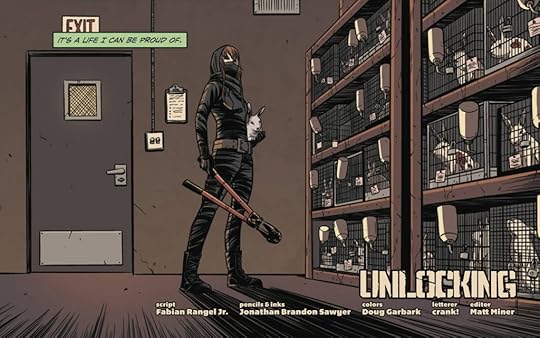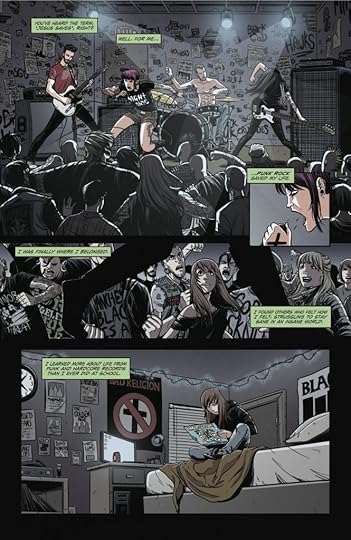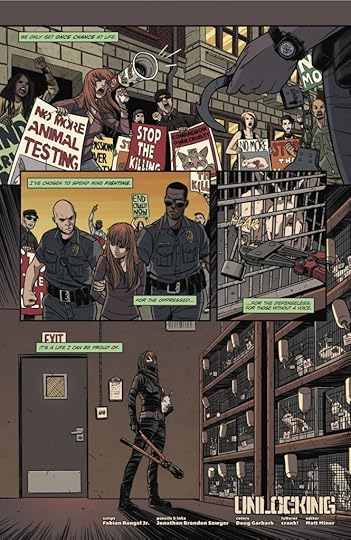Will Potter's Blog, page 12
April 8, 2014
Exclusive Look at New “Liberator” Comic — Radical Activist Superheroes
 When I received this collection of comics, I had to drop everything and read all of them. Liberator is a series about young vigilantes who go above the law (and go underground) to rescue animals from vivisection labs, dogfighting rings, and anywhere else they are abused.
When I received this collection of comics, I had to drop everything and read all of them. Liberator is a series about young vigilantes who go above the law (and go underground) to rescue animals from vivisection labs, dogfighting rings, and anywhere else they are abused.
What I love about the series is that it presents a counter-narrative to the political reality of “eco-terrorism.” The comics are of course fictitious. But they are also grounded in radical activism, drawing inspiration from groups like the Animal Liberation Front. When presented in comic form, these characters seamlessly transition from so-called “terrorists” to freedom fighters.
“Real heroes don’t wear capes,” Liberator’s tagline says. “They wear ski-masks.”
These are sympathetic characters and inspiring heroes. And for that reason, I have no doubt vivisection groups and animal abusing industries are going to flip out about the collection. TERRORIST PROPAGANDA! I can see the press releases now.
Liberator Volume 1: Rage Ignition collects the series in a book, and also includes new material. It will be out next week. Liberator was created by real-life dog rescuer Matt Miner, and the book is being published by Black Mask Studios, the new comics publisher from Brett Gurewitz (Bad Religion), Matt Pizzolo (Occupy Comics), and Steve Niles (30 Days of Night).
The folks at Black Mask Studios were kind enough to let me run this preview of one of the new comics. They were all fantastic, but you can probably guess why I chose this one.
“Unlocking”
Written by Fabian Rangel, Jr.
Illustrated by Jonathan Brandon Sawyer
Colored by Doug Garbark
Lettered by CRANK!
April 5, 2014
Fantastic Review of “Green Is the New Red” in Spain’s “Filosofía Hoy”
 The Spanish translation of Green Is the New Red received an excellent review in “Filosofía Hoy,” a very well-respected magazine in Spain.
The Spanish translation of Green Is the New Red received an excellent review in “Filosofía Hoy,” a very well-respected magazine in Spain.
I love the image as well! (The pullquote is from my book, and says: “As a culture, we have created a mythology of repression and resistance.”)
Los Verdes Somos Los Nuevos Rojos was published by Plaza y Valdes. You can find out more (included translations of some of my articles and interviews) here.
March 29, 2014
URGENT: Kentucky #AgGag Law Meant to Keep You From Seeing Shocking “Piglet Smoothie” Investigation
 Kentucky is the latest state to consider “ag-gag” legislation, which would make it illegal to photograph animal cruelty on farms and slaughterhouses. The bill was introduced just weeks after an undercover investigation by the Humane Society exposed a Kentucky pig factory that held pigs in tiny crates and fed what NPR called “piglet smoothies”—the remains of diseased piglets—to their mothers.
Kentucky is the latest state to consider “ag-gag” legislation, which would make it illegal to photograph animal cruelty on farms and slaughterhouses. The bill was introduced just weeks after an undercover investigation by the Humane Society exposed a Kentucky pig factory that held pigs in tiny crates and fed what NPR called “piglet smoothies”—the remains of diseased piglets—to their mothers.
There are only a few days left in the legislative session in Kentucky, and the lawmakers behind this dangerous proposal are moving quickly. The “ag-gag” provision was slipped into HB 222 at the last minute to avoid public scrutiny and debate.
Even more audaciously, they attached it to legislation that is intended to reduce animal suffering by setting euthanasia standards for shelters.
The “ag-gag” amendment would “prohibit agricultural operation interference that involves gaining employment by fraud to obtain a video or audio recording, conducting video or audio recording of an agricultural operation by pretense, or trespassing on an agricultural operation to obtain a video or audio recording.”
You would think that at this point, after so much consumer backlash to ag-gag, after opposition from Amnesty International, Human Rights Watch, the ACLU, and dozens of other organizations, that the agriculture industry would at least try to *pretend* that these laws aren’t about hiding their practices from consumers.
But when the Humane Society exposes horrific animal cruelty at factory farms like Iron Maiden, in Kentucky, and then a few weeks later the industry backs new legislation to make that whistleblowing illegal, Big Ag’s intentions are quite transparent.
“It’s a pretty big priority because we’re seeing a trend,” said Jeff Harper, director of public affairs for the Kentucky Farm Bureau, to the Associated Press. “Now it’s coming to Kentucky, and as a farm organization we thought it was our duty … to take some action.”
Instead of criminalizing the investigators and whistleblowers, perhaps the industry would be better off deciding to “take some action” and stop the practices that consumers find so appalling.
If you’d like to take action:
Please contact your state Senator today and politely say: “as your constituent, I urge you to oppose the anti-whistleblower Ag-Gag portion of HB 222 and to pass this bill WITHOUT ANY COMMITTEE SUBSTITUTES OR OTHER AMENDMENTS !” 1-800-372-7181!
March 27, 2014
Why None of the NSA’s Ideas Are Worth Spreading
 Mashable asked me to respond to the NSA’s address at TED 2014.
Mashable asked me to respond to the NSA’s address at TED 2014.
What’s the National Security Agency’s idea worth spreading?
TED’s Chris Anderson put the trademark question to NSA Deputy Director Richard Ledgett on Thursday during an interview at the Vancouver conference. Ledgett’s answer: “Learn the facts.”
In true TED style, that’s a surprising, thought-provoking statement. The problem is that it’s not the NSA’s idea at all. It’s the idea of their enemy number one: whistleblower Edward Snowden.
If it were up to the NSA, we wouldn’t know any facts at all about their operations. We wouldn’t even know what questions to ask.
The only reason we know about PRISM — and how every user of the Internet is beingwatched, and how the NSA is monitoring world leaders, and how porn habits were monitored to discredit “radicals,” (and on, and on) — is because Snowden leaked NSA documents.
We have no idea of the scope of the NSA’s operations, but what we do know was only possible because of a whistleblower.
It was surreal to sit at TED listening to Ledgett say “this is a really important conversation” to 1,200 attendees with a straight face, because the one and only reason the NSA had this rare public discussion at all today was — you guessed it —Edward Snowden.
Yesterday, Snowden risked his safety and freedom by speaking to TED attendees from an undisclosed location, via robotic display. His appearance surprised everyone — including, Ledgett said, the NSA: He awkwardly joked: “Kudos to you guys on that.”
Overnight, Snowden’s interview had already racked up 300,000 views, and the NSA, which had previously not bothered to respond to TED’s invitation, had to engage the discussion.
TED’s Chris Anderson attempted to use the rare opportunity to get some actual facts and data out of Ledgett, to no avail. At one point Anderson asked about the NSA’s claims that Snowden’s leaks have put American lives at risk. Ledgett dodged it, and Anderson asked again.
“The capabilities [of the NSA] are applied in very discreet and measured and controlled ways,” Ledgett responded. “As adversaries see that and recognize, ‘Hey, I might be vulnerable to that,’ they move away from that.” It was an ambiguous, empty, non-answer.
As was with the rest of Ledgett’s commentary: all rhetoric, no facts. A better way to describe the NSA’s “idea worth spreading” might be:
Trust us and stop worrying: If you aren’t doing anything wrong, Ledgett said, “you’re not of interest to us.” What he ignored is that the NSA is vacuuming up information, and storing it indefinitely, so that it may be used against you later.
We don’t know what we need, so we need it all: Ledgett said he didn’t know what NSA surveillance was important, because it’s all pieces of a bigger puzzle. The reality is that the NSA isn’t working with a mosaic or a puzzle. What the NSA is really advocating is the collection of millions of pieces from different, undefined puzzles in the hopes that sometime, someday, the government will be working on a puzzle and one of those pieces will fit.
A website called badguys.com ”would be awesome,” Ledgett said, and a big help catching bad guys.
What’s refreshing, though, is that none of the NSA’s ideas seem to be spreading at TED. This is my first TED conference. I’m here as a TED Fellow, and I was unsure how Snowden’s comments — and my own talk about how the FBI labels protesters as “eco-terrorists” — would be received.
It’s one thing to take to the TED stage and talk about curing disease or a cool new app. But Snowden? Addressing a bunch of CEOs and tech elite who have paid at least $7,500 to attend? How would they respond?
The crowd here has been supportive of Snowden’s whistleblowing. When Anderson asked the crowd whether Snowden’s actions were “fundamentally heroic,” more than half raised their hands. After Snowden spoke, lines formed to take selfies with his robot.
Ledgett was applauded at the end of the interview, and a few TEDsters attempted a standing ovation. But I asked several of those who stood, and they told me it was for the discussion forum TED created, rather than Ledgett’s comments. Regardless of how they feel about the specifics of what he did, and how he did it, almost everyone seems to appreciate that it has created a vibrant, overdue debate.
Perhaps the best indication of this atmosphere came just moments before Ledgett took the stage. Ed Yong, a science writer, spoke about research on parasitic behavior, and asked the audience: “Are there dark sinister parasites who are influencing our behavior without us knowing about it?”
“Besides the NSA?”
Will Potter is a TED Fellow and the author of Green Is the New Red. Follow him on Twitter@will_potter.
Seattle! Speaking Events This Sunday and Monday
 I’ll be in Seattle this Sunday, March 30th and Monday, March 31 for two speaking events:
I’ll be in Seattle this Sunday, March 30th and Monday, March 31 for two speaking events:
Tree Sits and Glitter Banners: How new terrorism laws are meant to silence environmental protest
When: Sunday, March 30, 6:00pm – 8:00pm
Where: Black Coffee Coop – 501 E Pine Street, Seattle
RSVP on Facebook
AND
When: Monday, March 31, noon – 1:00pm
Where: Seattle University School of Law, Sullivan Hall, Room C-5 (lower level) – 901 12th Avenue, Seattle
Notes: part of the Social Justice Mondays series; a light vegan lunch will be provided
RSVP on Facebook
Environmental and animal rights activists have been labeled the “number one domestic terrorism threat” by the FBI, despite the fact they have never harmed a human being. Now, corporations are urging prosecutors to push the limits of terrorism laws with ambitious prosecutions against protesters. And around the country, new legislation has been proposed that labels tactics like civil disobedience as terrorist crimes. Will Potter will discuss the history of this “eco-terrorism” rhetoric, and current threats to civil rights.
This event is sponsored by the National Lawyers Guild Seattle Chapter, with support from the Seattle University School of Law chapters of the NLG and the Student Animal Legal Defense Fund.
March 17, 2014
BREAKING: We’re Suing Idaho to Overturn #AgGag Law Against Filming Animal Cruelty
 Today a diverse coalition of civil rights, animal protection, labor, and environmental groups, and a journalist (me) have filed a lawsuit to strike down Idaho’s new “ag-gag” law as unconstitutional.
Today a diverse coalition of civil rights, animal protection, labor, and environmental groups, and a journalist (me) have filed a lawsuit to strike down Idaho’s new “ag-gag” law as unconstitutional.
Idaho’s governor “Butch” Otter just signed “ag-gag” into law last month. But we’re moving quickly to overturn this dangerous bill because it’s a direct attack on whistleblowers, investigators, and journalists. Most importantly, laws like this are an attempt to keep everyone from knowing what really takes place behind closed doors on factory farms and slaughterhouses.
As a quick background: A wave of undercover video investigations by groups like Mercy for Animals and PETA have exposed horrific animal cruelty on farms. In Idaho, workers were exposed by Mercy For Animals punching, kicking, and sexually abusing cows.
Rather than address these abuses, Big Ag is trying to keep you from seeing them.
Idaho is the seventh state to pass an ag gag law, and the first to do so since 2012. I’m also a plaintiff in the first ag-gag legal challenge, in Utah.
There, I reported on the first ag-gag prosecution in the country, against a young woman who filmed a sick cow being moved by a bulldozer, as she stood on the public street. I broke the story, and it created such public outrage that prosecutors dropped all charges within 24 hours.
That’s why I’m a plaintiff in Idaho, as well.
These ag-gag laws are turning my sources into into criminals, they are placing journalists like me in the legal crosshairs, and they are chilling a vibrant national discussion about animal protection, food safety, the environment, and workers’ rights.
I wish I could be in Idaho today for the press conference, but I’m at TED about to speak about my book, and how protest is being labeled “terrorism.” I’m proud to be a plaintiff alongside groups like the American Civil Liberties Union of Idaho, Farm Sanctuary, Farm Forward, and the Center for Food Safety.
And I’m honored that more than 16 professional journalism organizations have authored a letter to the court in support of my position, and in support of the First Amendment.
These ag-gag laws cannot withstand public scrutiny. It’s time to shine a line on Big Ag’s attempts to keep us all in the dark.
March 13, 2014
Coming Soon…
 I’m off to Vancouver for the TED conference, but before I go I wanted to tell ya’ll to keep your eyes open for a new project that will be coming out in the next week. I’m really excited about it, and hope you will be too. More soon!
I’m off to Vancouver for the TED conference, but before I go I wanted to tell ya’ll to keep your eyes open for a new project that will be coming out in the next week. I’m really excited about it, and hope you will be too. More soon!
March 7, 2014
Chevron Says Hell Will Freeze Over Before It Pays For Pollution
 My latest article for VICE:
My latest article for VICE:
When 30,000 Ecuadorian villagers sued Chevron in 1993 for devastating the Amazon with 18 billion gallons of toxic wastewater, the US-based oil giant’s reply was simple: “We will fight [the lawsuit] until hell freezes over,” said a representative. “And then fight it out on the ice.”
After investigators documented what they call a “Rainforest Chernobyl”—17 million gallons of spilled crude oil, more than 1,000 open waste pits full of toxic waste polluting the drinking water, and thousands of victims of cancer and birth defects—it seemed justice was served for the villagers. In 2011, an Ecuadorian court ruled against Chevron and demanded the company pay $19 billion in restitution. Ecuador’s Supreme Court later reduced the damages to $9.5 billion but upheld that ruling.
But on Tuesday, a U.S. court effectively overturned the ruling, which means Chevron has won the fight and hell, apparently, has frozen over. They’ve won using what activists say are dirty tactics, including filing a countersuit against the Ecuadorian villagers, claiming they had lied all along about the pollution caused to their properties as part of a shakedown scheme.
Chevron hired a legal team of more than 60 law firms and 2,000 legal professionals to argue that it’s not the villagers who are the victims here—it’s the corporation.
The villagers won in Ecuadorian court fraudulently, Chevron argued, because their lead attorney, Steven Donziger, used bribery and fabricated evidence. One of the primary claims is that a scientific report by an Ecuadorean court-appointed expert was created by activists. Donziger admits activists coordinated with the scientific firm, but argues that the science is entirely sound and denies any wrongdoing on this or any other of Chevron’s charges. He says the lawsuit is “the most well-funded corporate retaliation campaign in history.”
Because he was charged of fraudulence, Donziger is liable under the civil provisions of RICO, the Racketeer Influenced and Corrupt Organizations Act. It’s the law designed to go after the mafia.
The company had sought $60 billion in damages against Donzinger in its RICO suit, saying that the pollution claims are a carefully orchestrated campaign by Donziger to get into Chevron’s deep pockets. The claims for damages were eventually dropped. But this week Chevron won its RICO suit to evade payment. Now it will be even harder, if not impossible, for Donziger and the villagers to enforce the Ecuadorian’s court’s judgment against Chevron.
Environmental groups believe this ruling has far-reaching implications beyond the Amazon, though. They say it signals a new trend in how corporations silence their opposition. More than 44 of them—including the Sierra Club and 350.org—signed a letter opposing the lawsuit, calling it a “growing and serious threat to the ability of civil society to hold corporations accountable for their misdeeds around the world.”
Paul Paz y Miño of Amazon Watch says this kind of tactic could be used by any industry to avoid accountability. Environmentalists and consumer groups don’t have the money to fight a corporate army of attorneys. “If they don’t have the resources to make that fight legally, they may have to just pick another campaign,” he warns. “And it would end there.”
Those fears appear to be warranted. Corporate attorneys are already saying this is “the new model for fighting back” for big business.
It’s a new model that directly puts journalists at risk, as well. As part of its lawsuit, Chevron also fought to force documentary producer Joe Berlinger to turn over 600 hours of raw footage— a move opposed by the New York Times, ABC, CBS, and many other media outlets. The footage included what Berlinger saw in Ecuador: an ecosystem under assault. The tapes also included fly-on-the-wall recordings of strategy sessions with the legal team, and Chevron says it could help its case. But the media outlets warned that Chevron is bullying journalists.
Chevron also fought to get access to its critics’ personal information, including the IP addresses and identities of more than 100 email accounts of environmentalists and journalists.
Going after protesters, lawyers, and journalists as gangsters is particularly ironic considering that this is the same Chevron that hired the Nigerian military to violently shut down protests by unarmed fisherman and villagers in Nigeria, as exposed in an award-winning documentary by Amy Goodman and Jeremy Scahill.
The fight in this case is still not over. The coalition of groups involved say they’ll keep pushing forward to hold Chevron accountable.
Han Shan, the US spokesman for the Ecuadorian villagers, says the focus is now on “enforcing their judgment in countries where they can receive a fair hearing.”
Chevron and other corporations will only be emboldened, though. As the right-wing blog Hotair.comnoted, “Is there any way at this point for Chevron to turn this around and drag Donziger [the lead attorney] and company, along with the Ecuador court actors, into a court someplace and drain every last cent out of them until they have to live under a bridge somewhere?”
Will Potter is a journalist and TED Fellow based in Washington, DC. Visit his website and follow him on Twitter.
March 6, 2014
Announcing the 2014 Australia Speaking Tour Against #AgGag Laws
 I’m thrilled to announce that I’ll be the international keynote speaker for the 2014 Voiceless Animal Law Lecture Series. As you know, “ag-gag” laws are going global, and the factory farming industry in Australia is trying to model their legislation after what we’ve seen in states like Idaho. The focus of this lecture series couldn’t be more timely: “Ag-gag Laws: The Bid to Silence Animal Advocates.”
I’m thrilled to announce that I’ll be the international keynote speaker for the 2014 Voiceless Animal Law Lecture Series. As you know, “ag-gag” laws are going global, and the factory farming industry in Australia is trying to model their legislation after what we’ve seen in states like Idaho. The focus of this lecture series couldn’t be more timely: “Ag-gag Laws: The Bid to Silence Animal Advocates.”
I’ll be visiting 12 venues throughout Australia, mainly universities and law schools. This will be the longest speaking tour I’ve ever done (over a month), and I can’t wait.
Here’s a bit more about the tour, and how to sign up!
Governments in the US have begun to threaten the work of animal advocates through the introduction of ‘ag-gag’ laws which, among other things, make it illegal to covertly film or photograph livestock facilities.
In 2006, the US government passed the Animal Enterprise Terrorism Act which packages up all forms of non-violent resistance that might threaten agricultural profits and labels them as acts of ‘domestic terrorism’.
Support for ag-gag legislation has now begun to creep into Australian politics, with parliamentarians from both sides of politics calling for similar laws. The 2014 Voiceless Animal Law Lecture Series will examine the rise of ag-gag laws and their effect on transparency and public discourse.
To present this topic, Voiceless is proud to welcome award-winning journalist and one of America’s foremost ag-gag experts, Will Potter, as our keynote speaker.
The lecture series will explore the use and manipulation of politics, the media and the law by agribusiness to demonise and undermine the animal protection movement, and incite fear within the public.
Find your local venue and register now.
Al Jazeera Discusses Ag-Gag Laws and the Corporate War on “Eco-Terrorism”
 I was a guest on Al Jazeera recently to discuss how the War on Terrorism has been used to target protest groups and whistleblowers who expose animal cruelty on factory farms.
I was a guest on Al Jazeera recently to discuss how the War on Terrorism has been used to target protest groups and whistleblowers who expose animal cruelty on factory farms.
It was a pleasure being on the same show with Laura Beth Nielsen and Shiraz Maher, and connecting the dots between the civil rights abuses against Muslim communities and this crackdown on dissent.
From Al Jazeera:
For over a decade now, the United States has used the word ‘terrorism’ to wage wars beyond its borders and the same word has been used within its borders to spy on Americans.
The latest case was in New York. A federal judge has ruled that the city’s police department’s surveillance of Muslims in New Jersey was a legal effort to prevent terrorism, not a civil rights violation.
And the US is not alone. Several countries across the globe have used the pretense of ‘terrorism’ to crackdown on opponents, through various anti-terror laws.
So, has this word been exploited?
Presenter: Shihab Rattansi
Guests: William Potter: an award-winning journalist and author of ‘Green Is The New Red: An Insider’s Account of a Social Movement Under Siege’
Laura Beth Nielsen: a research professor at the American Bar Foundation and director of the Legal Studies Program at Northwestern University
Shiraz Maher: a fellow at the International Centre for the Study of Radicalisation at King’s College London; who is currently leading a research team looking into the flow of foreign fighters going to Syria








